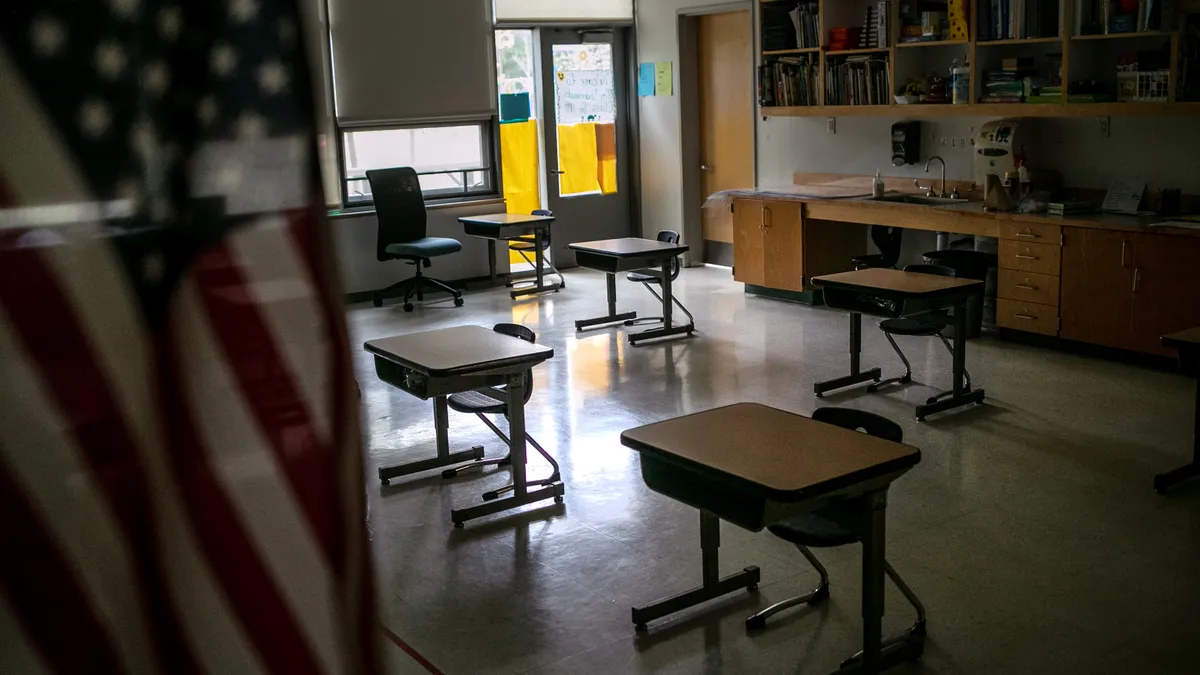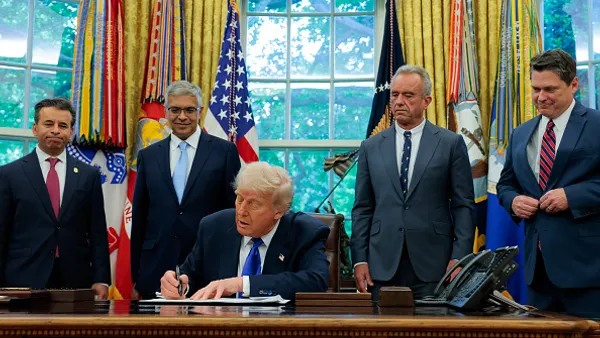Dive Brief:
- Democratic and Republican lawmakers agree schools should be supportive and safe environments for students, but some differ over the role the federal government should play in limiting exclusionary discipline practices, according to discussion during a virtual House Early Childhood, Elementary, and Secondary Education Subcommittee hearing Wednesday.
- While Democrats said Congress has a responsibility to help schools limit or abolish restraint, seclusion and corporal punishment, Republicans said federal interference is not needed in local discipline practices. "Ultimately, school boards and school officials must work in engaging parents in these important discussions regarding their children's welfare," said Utah Republican Rep. Burgess Owens. "Parents know what works best for their own children."
- Partisan differences in the hearing over school responses to student behaviors and mental health needs reflect the greater debate across the country about how much flexibility or limitation school systems should have in curriculum and student social and behavioral approaches.
Dive Insight:
The two-and-a-half hour, wide-ranging conversation touched on various topics, including disproportionality in discipline, root causes of dangerous student behaviors, pending legislation for parental rights, and limitations for the use of restraint and seclusion. Lawmakers heard from witnesses with different perspectives and experiences on exclusionary practices.
Guy Stephens, a parent from Lusby, Maryland, and founder and executive director of Alliance Against Seclusion and Restraint, shared the story of his son, who has autism and, Stephens said, was traumatized after being restrained and secluded at school. His son was eventually homeschooled because he did not feel safe at school, said Stephens, who told lawmakers about myths concerning restraint and seclusion.
"We also hear the myth that seclusion is safe and calming," Stephens said. "Nothing could be further from the truth. There is nothing calming about being thrown into a room against your will alone while the door's being held shut."
Max Eden, a senior fellow at American Enterprise Institute, a right-leaning public policy think tank, said while there are examples of inappropriate restraint and seclusion practices, the reality is teachers need the flexibility to use those approaches to keep themselves and students safe in dangerous situations.
Eden blamed the current mental health and school safety crisis on teacher unions and "their allies" for supporting school closures and masking requirements. "They have shown a total willingness to prioritize ideology over safety in all facets of education," he said.
Subcommittee Chair Gregorio Kilili Camacho Sablan, a Democrat from the Northern Mariana Islands, said he supports prohibiting seclusion and limiting the use of physical restraint, as well as providing training for teachers and supporting schools to create positive school environments.
"Congress must work to help schools replace outdated practices with evidence-based strategies to create healthier school environments for all students," Sablan said.
Several lawmakers and witnesses discussed disproportionate use of exclusionary discipline for students of color and students with disabilities. Black students, for example, were overrepresented among students who were suspended from school, received corporal punishment or had a school-related arrest, according to a 2018 Government Accountability Office report using data from the 2013-14 school year.
Morgan Craven, national director of policy, advocacy and community engagement for the Intercultural Development Research Association, told the panel that while children of color are not more likely to break school rules, they are simply more likely to be punished, sometimes harshly.
She asked lawmakers to ban corporal punishment, which she said remains permissible in 19 states. "The practice still exists in schools and we should all be shocked by that," Craven said. "Not only is it baffling that anyone would be allowed to hit a single child in school, but the frequency with which corporal punishment is used is horrifying."
Craven said that during the 2017-18 school year, about 70,000 children were hit in their schools. Corporal punishment is used disproportionately against Black children and other children of color, she added.
Kristen Harper, vice president for public policy and engagement at Child Trends, a nonpartisan research organization focused on improving the lives of children, said schools can best support students and families by providing consistent, whole-child support, including health screenings, positive school-home and student-teacher relationships, and access to mental health services.
Harper recommended professional development that helps educators respond empathetically to behaviors of a child experiencing trauma.
"If our response to that child is corrective action rather than support, then our schools become the source of harm and trauma rather than the lifelines that they can be," Harper said.










